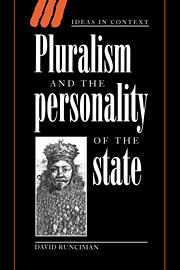Book contents
- Frontmatter
- Contents
- Preface
- PART I THE PERSONALITY OF ASSOCIATIONS
- PART II POLITICAL PLURALISM
- 5 Maitland and the real personality of associations
- 6 Figgis and the communitas communitatum
- 7 Barker and the discredited state
- 8 Cole and guild socialism
- 9 Laski and political pluralism
- 10 The return of the state
- PART III THE PERSONALITY OF THE STATE
- Bibliography
- Index
- Ideas in Context
10 - The return of the state
Published online by Cambridge University Press: 10 November 2009
- Frontmatter
- Contents
- Preface
- PART I THE PERSONALITY OF ASSOCIATIONS
- PART II POLITICAL PLURALISM
- 5 Maitland and the real personality of associations
- 6 Figgis and the communitas communitatum
- 7 Barker and the discredited state
- 8 Cole and guild socialism
- 9 Laski and political pluralism
- 10 The return of the state
- PART III THE PERSONALITY OF THE STATE
- Bibliography
- Index
- Ideas in Context
Summary
The single most striking feature of the pluralist movement in English political thought is the abrupt way in which it ends. During the second decade of this century pluralistic ideas were the dominant influence on political theory in England, and there were few areas of intellectual life that they did not touch in one form or another. Then, in 1920, this influence suddenly ceased. Maitland and Figgis were, of course, by this time dead; but more significantly, neither of them had succeeded in founding a school of like-minded historians to pursue their interest in the question of group personality. This was a fact lamented by Laski, who wrote in 1925 that ‘men like Maitland – perhaps the greatest legal genius in England since Bentham – were never able to gather around them disciples to carry on their work’. Yet Laski, once a potential disciple, had long since lost interest in these questions himself. As early as February 1920 he had written to his friend Holmes, with typical modesty:
There is only one moment in history where feelings comparable to mine just now have developed – when the Holy Ghost knew that whatever Joseph did was too late because the incarnation had taken place. In other words, I have begun my new book, and I feel lyrical about it … I've decided to call it A grammar of politics.
- Type
- Chapter
- Information
- Pluralism and the Personality of the State , pp. 195 - 220Publisher: Cambridge University PressPrint publication year: 1997

